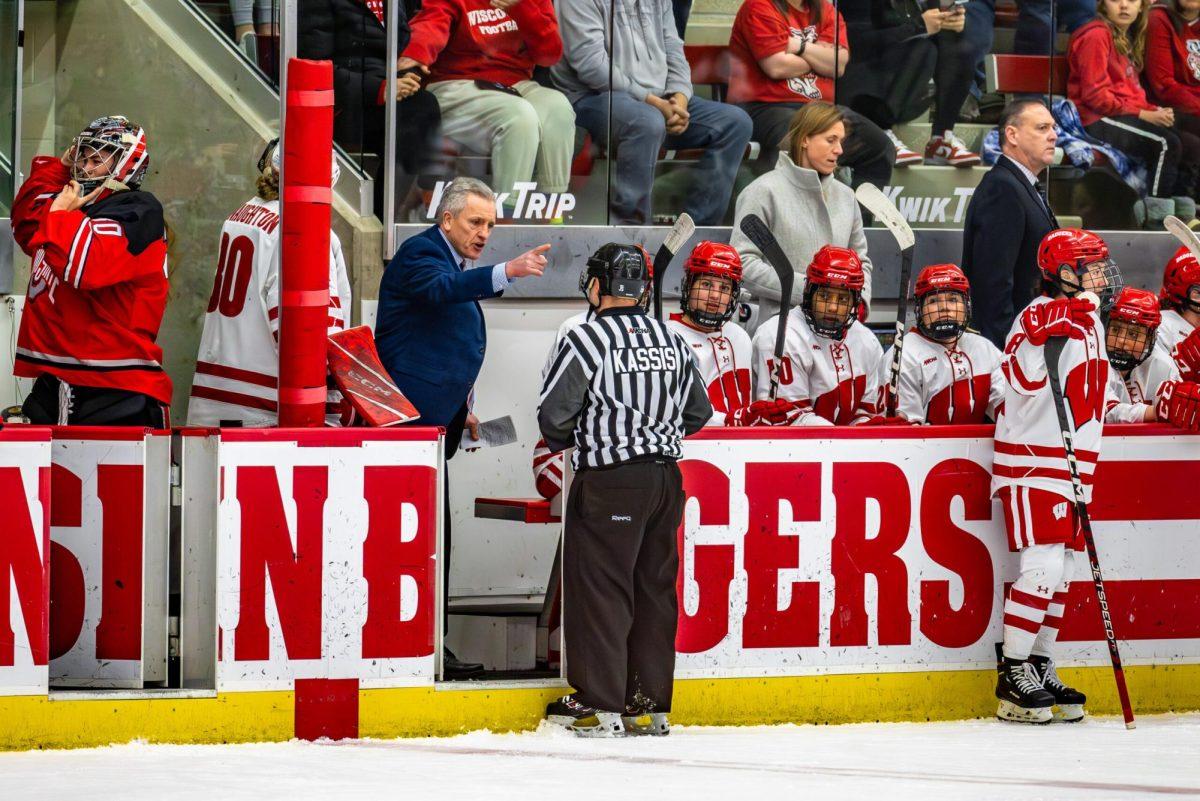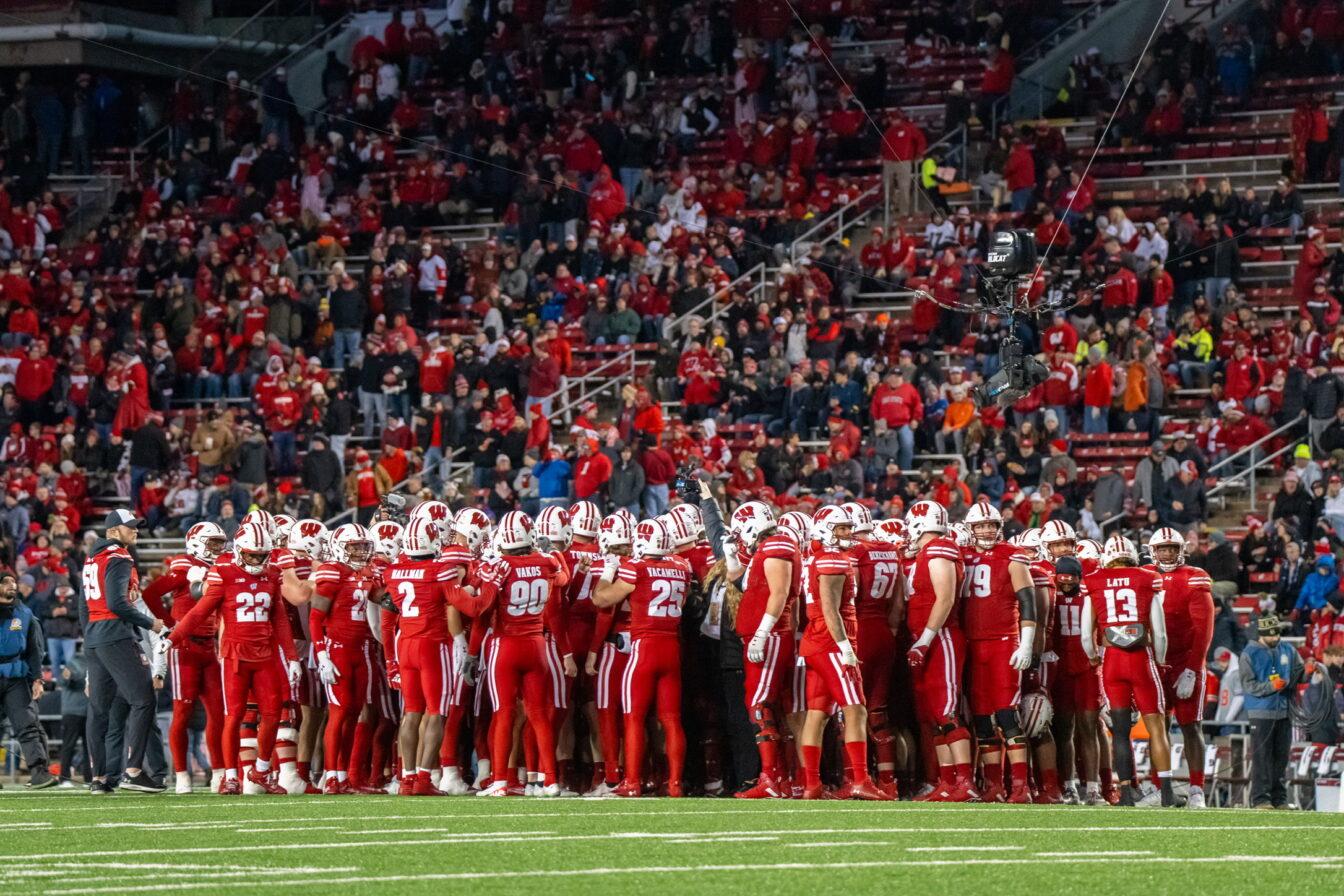When Pat Richter took his seat as the athletic director 14 years ago, all he wanted to do was clean up the mess that was the UW athletic department. Since then, Richter has taken Badger athletics from a state of futility to levels of unprecedented achievement and acclaim. With Wisconsin athletics instilled as a national threat, Richter will step aside and watch from a distance, after his retirement effective April 1, 2004.
Pat Richter was raised in Madison and attended the University of Wisconsin. He was a highly decorated athlete while a student, lettering three times each in football, basketball and baseball. Richter was an All-American tight end in both 1961 and 1962 and was drafted by the Washington Redskins, where he played eight seasons of professional football. After enjoying a successful athletic career, Richter settled into the business world not expecting to impact the sporting world again. While always remaining loyal to his alma mater, Richter “did not expect to have such an influential role in Badger athletics.”
However, when Wisconsin offered Richter the position of school athletic director in 1989, he was more than happy to accept. Upon returning to UW, the graduate assumed his new role, inheriting a fledgling department teetering on the brink of disaster. Richter was presented with the daunting task of rebuilding a program with a $2.1 million deficit, decaying facilities, several struggling teams and declining fan support.
“It was difficult emotionally and mentally,” recollected Richter. “There was a definite sense of urgency to fix the department.”
Richter and his staff had to find a way to get the ball rolling so people could feel good about UW athletics and so that the attention would return. In Richter’s eyes, football was the key to jump-starting all of Badger athletics.
“Hockey was carrying us, and we were treading water in several other sports,” Richter commented on the situation when he arrived at UW. “We wanted to try and get better and improve, so football had to get healthy.”
It would be this goal that has become the cornerstone for the UW athletic department.
“Football gets more attention and publicity than other sports,” Richter said. “It had to be our number-one priority.”
Richter’s first move was to hire Notre Dame assistant coach Barry Alvarez as the head football coach in 1990.
“We had to get the right coach,” Richter said. “We could not afford for him to not be successful.” Football had to be successful because of the revenue it generates for the rest of the department. To Richter, football “had a ripple effect on the other things [UW athletics] were trying to accomplish.”
The fruits of Richter’s labor paid off when the Badgers won its first Rose Bowl in 1994.
“It wasn’t the best season, but it was something really special,” remembered Richter.
Richter, who had himself set Rose Bowl receiving records in the Badgers’ previous appearance in 1963, felt that the victory “got the monkey off our back.” Two more Rose Bowl titles and the success of Heisman Trophy winner Ron Dayne solidified Badger football as one of the most successful programs in the country. Richter believes that football’s accomplishments “changed the mindset around here. … People became euphoric about the Badgers.” Merchandising opportunities sprung up for the school in the form of Bucky Badger. The school also signed apparel contracts, first with Reebok, and now with Adidas. This added revenue helped eliminate the department’s deficit and allowed for some room for the program to grow in other areas.
“It was really a snowball effect,” Richter said. “The first Rose Bowl elevated everything.”
Richter’s next challenge was to restore the struggling basketball program. When Richter arrived, Wisconsin basketball had been mired in mediocrity since winning the 1941 National Championship. Basketball experienced relative success in the early ’90s under coaches Steve Yoder, Stu Jackson and Stan Van Gundy, but Richter was still looking for the coach to build the program around. Richter found his man in 1995 when he hired UW-Green Bay head coach Dick Bennett.
“Dick brought stability to our recruiting and to our program,” Richter said.
Bennett also brought with him his trademark tenacious defense that led Wisconsin to three NCAA tournaments, including a Final Four appearance in 2000. After Bennett’s resignation midway through the 2000-01 season, a search for his permanent replacement began. Richter decided on former UW-Platteville and UW-Milwaukee coach Bo Ryan. Under Ryan, the Badgers have won unprecedented back-to-back Big Ten championships.
“We couldn’t be any more fortunate to have Bo Ryan here,” Richter said.
Richter is more than pleased with the progress made by the basketball program during his tenure and believes that only good things are to come.
Richter has also overseen the development of new athletic facilities, most notably the Kohl Center. While the Fieldhouse was “functional,” according to Richter, he believes that the Kohl Center not only provides a better home for basketball and hockey but also does more for the image of the school.
“Building the Kohl Center,” Richter said, “signaled that we were trying to do some things to generate interest in athletics.”
Additionally, he has been a chief supporter of the renovation process of Camp Randall Stadium. “Our new facilities have helped us because they are revenue generators,” Richter said.
Richter emphasized that “changes needed to be made for the better” in order to sustain the success of the department in the future.
It is Richter’s dedication to the development and management of Badger athletics at a level of excellence that has brought him praise from his colleagues.
“The things he did as athletic director here over the years amaze me,” men’s basketball coach Bo Ryan said. “People don’t realize all the things that go on behind the scenes to make things happen. I am impressed with how he handles such a tough task.”
One person who has watched what goes on behind the scenes is Associate Athletic Director Vince Sweeney.
“Pat is a man of great integrity and character,” Sweeney, a co-worker of Richter’s for nearly 12 years said. “These are qualities that have made him successful in just about everything he’s done. It has been a privilege and an honor to work alongside him. It’s going to be sad when he’s gone.”
Pat Richter will step down from his position next April after nearly 15 years of service to the UW athletic department. He insists that he will not be coming back to the school in a full-time position.
“I’ll be around,” he said. “But I won’t get in the way.”
Looking back over his time as athletic director, Richter has fond memories of what he has helped the school accomplish.
“I am really fortunate for everything that has happened,” Richter said. “I wouldn’t be doing this anywhere else.”
Richter just hopes that people remember him as “the hometown boy who made good.” To neighbors, colleagues and fans, he will be considered as being more than that. He will be remembered as the man who turned around Wisconsin athletics.














